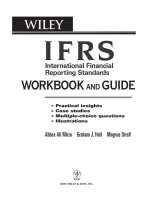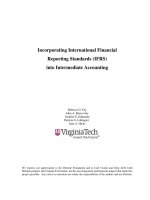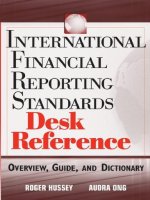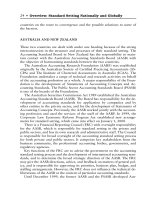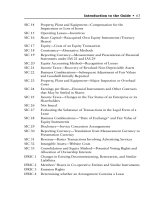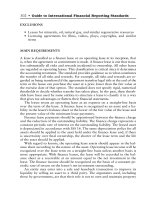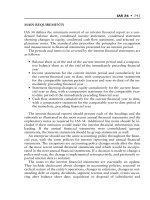Adoption of International Financial Reporting Standards in Greece: A critical approach
Bạn đang xem bản rút gọn của tài liệu. Xem và tải ngay bản đầy đủ của tài liệu tại đây (1.77 MB, 298 trang )
Adoption of International Financial Reporting Standards in Greece:
A critical approach
The thesis is submitted in partial fulfilment of the requirements for the award of
the degree
of Doctor of Philosophy in Accounting and Financial Management
of the University of Portsmouth
by
ELISAVET MANTZARI
First Supervisor: Lisa Jack
Second Supervisor: Tony Hines
November 2013
i
Declaration
Whilst registered as a candidate for the above degree, I have not been registered for any other
research award. The results and conclusions embodied in this thesis are the work of the
named candidate and have not been submitted for any other academic award.
i
Acknowledgements
I would like to express my gratitude to my supervisors Lisa Jack and Tony Hines who
commented on my work and helped me throughout my PhD. In particular, Lisa’s knowledge
and support guided me after the conduct of my interviews and has given me the freedom to
develop my ideas without objection. Her creative commentary, inspiration and kindness
provided rigorous insights in the organisation of this thesis. I would also like to thank my
examiners, Christine Cooper and Mike Page for their encouraging, constructive and
thoughtful feedback. Other colleagues and academics have also helped me out with ideas and
encouragement. I wish to express my thanks to Stavros Mavroudeas, Leandros Bolaris,
Ioannis Christodoulou and Orthodoxia Kyriacou who read and commented on parts of the
project.
I should also express my gratitude to those people I hold dearest, were in spirit to support my
research process with sentimental warmth. First and foremost my parents Despoina Nikolaou
and Ioannis Mantzaris: without their help, guidance and emotional support this research
would have been impossible. I am also grateful to other members of my family and friends,
my grandparents Charikleia and Costantinos, my sister Chara, Tina, James and Davide
amongst them, for uplifting my spirits. I truly thank Argyris for sticking by my side and being
a great supporter during my good and bad times. The best outcome from the past year is
finding the most wonderful and special friend, Miguel. I am grateful to you for your support
during the final steps of the submission of my thesis and I am looking forward to celebrating
the completion of your PhD soon!
While this thesis was being written, Europe was undergoing radical transformations and
sparked different ways to think about the economy. Accounting plays a role in shaping
‘common sense’ assertions and has a wide impact on the economy, society and also in our
everyday life. This conviction has strengthened the writing of this thesis and the idea that
there is more to economy than accounting numbers and practices. In this light, the thesis is
dedicated to those Greeks who resist the crisis, politically struggling against it and offer an
alternative perspective.
ii
Abstract
This thesis studies the way the profession, key actors and other users perceive the use of IFRSs in
Greece. The focus is mainly on providing evidence of perceptions towards the transition and
implementation process, the way financial statements are used, what challenges are encountered
and the recognised benefits after the adoption of IFRSs. The thesis explores the views of actual
users about the usefulness of financial reports relating to the impact of IFRSs in an economy with
different institutional infrastructures and accounting tradition from the ‘Anglo-Saxon’ model. It
provides a critical perspective on the understanding of actors’ experience and interpretation of
accounting change and challenges unquestioned beliefs and taken-for-granted assumptions
surrounding the adoption of IFRSs. Drawing on a historical and political economy analysis of
(inter)national accounting standard-setting and practices the driving rationale behind actors’
views is investigated. Gramsci’s conceptual vocabulary is utilised in order to encourage a
theoretical insight into the empirical material.
Empirical evidence has been gathered through interviews with key individuals in the
implementation and establishment of IFRSs and secondary data, such as public statements,
policies and the IASB’s exposure drafts and comments. The impact of IFRSs is evident in areas
of measurement and disclosure while the user groups that make meaningful use of IFRSs’
financial information is narrow. The identified benefits of IFRSs in terms of the usefulness of
financial information feature great similarity and consensus among local key actors. However,
there are still challenges in the implementation and interpretation of IFRSs hindering the
accomplishment of the IASB’s pronouncements in regard to the benefits of the standards. IFRSs
convergence seems to improve over time. The state exerts significant influence over accounting
practices and taxation considerations are generally considered as inhibiting compliance with
IFRSs. It appears that there is a shift in the perceptions and beliefs of key individuals about the
role of financial reporting in line with the neo-liberal shift in the rationale of IFRSs as promoted
by standard-setters and dominant capital economies. The thesis challenges the position purported
by standard setters that the adoption of IFRSs is a necessity driven by the natural forces of
economic globalisation and that it results in improved decision usefulness of financial statements.
There is more to financial reporting quality and comparability than imposing a common set of
standards. Despite the inconsistencies in the application of IFRSs and the contradictions in actors’
views about the actual benefits of IFRSs, this has not led them to challenge the basic assumptions
and hegemonic structures inherent in the domain of accounting and capital markets.
iii
Contents
Declaration .......................................................................................... i
Acknowledgements ................................................................................ ii
Abstract ........................................................................................... iii
List of Tables ..................................................................................... ix
List of Figures .................................................................................... ix
List of Abbreviations .............................................................................. x
Chapter 1: Introduction ............................................................................ 1
1.1 Background ................................................................................................................... 1
1.2 Motivations of the study ............................................................................................... 3
1.3 Research issues and research questions ........................................................................ 5
1.4 Theoretical framework .................................................................................................. 7
1.5 Structure of the thesis ................................................................................................... 9
Chapter 2: Globalisation and the Internationalisation of Financial Reporting Standards .... 11
2.1 Introduction ................................................................................................................. 11
2.2 Defining globalisation, capitalism and neo-liberalism ............................................... 12
2.3 Economic globalisation: Myths and Realities ............................................................ 15
2.3.2 The reality of imperialism ........................................................... 17
2.3.3 Deconstructing the arguments on globalisation.................................... 19
2.3.3.1 Globalisation as a benevolent phenomenon ...................................... 19
2.3.3.2 The nation state and its relationship to the capitalist economic system ........ 20
2.3.3.3 Globalisation and supranational governance .................................... 22
2.4 Financialisation: a new stage of capitalism?............................................................... 23
2.5 Globalisation and its impact on the EU financial reporting developments ................ 24
2.5.2 Financial reporting diversity and EU accounting harmonisation efforts ......... 26
2.5.2.1 Pre-IFRSs accounting harmonisation ............................................ 27
2.6 The emergence of the IASB and its ascendance in the era of globalisation ............... 29
2.7 Imperialist Controversies and their impact on the accounting field: the US vs. the EU
.......................................................................................................................................... 32
2.7.1 The domination of the US ........................................................... 32
2.7.2 The intervention of the European Union............................................ 34
2.8 Critical reflection on the impact of imperialist rivalries on the function of the IASB
and the nature of its standards........................................................................................... 36
2.8.1 ‘Americanisation’ of international financial reporting standards ................ 36
2.8.2 Impact on the IASB’s structure and standard setting processes ................... 37
2.8.3 Significance of nation states ......................................................... 40
iv
2.9 Conclusion .................................................................................................................. 42
Chapter 3: The evolution of the capital market and financial reporting in Greece: a historical
perspective ....................................................................................... 44
3.1 Introduction ................................................................................................................. 44
3.2 Dependency theories and the position of Greece in the imperialist chain .................. 45
3.2.1 Theories of dependency and their demise .......................................... 45
3.2.2 The role of Greece in the imperialist chain......................................... 47
3.3. Historical Review and Economic and Political Developments in Modern Greece:
influence on accounting .................................................................................................... 49
3.3.1 Impact of Western capitalism and its institutions .................................. 49
3.3.2 Period 1973 till 2005 (pre-IFRSs period) .......................................... 49
3.3.3 The IFRSs era ........................................................................ 53
3.4. Conclusion ................................................................................................................. 54
Chapter 4: International Accounting Harmonisation: Literature Review ..................... 56
4.1 Introduction ................................................................................................................. 56
4.2 On harmonisation ........................................................................................................ 56
4.3 Local environmental and institutional factors that affect accounting harmonisation . 58
4.3.1 Relative importance of the law and the True and Fair View ...................... 60
4.3.2 Providers of Capital ................................................................. 61
4.3.3 Influence of Taxation ................................................................ 63
4.4 Objectives of IFRSs .................................................................................................... 66
4.4.1 Principles- based vs. Rules-based financial reporting standards ................. 66
4.4.2 Users and decision-usefulness of financial reporting information ................ 67
4.5 Fundamental qualitative characteristics of financial statements under the IFRSs...... 70
4.5.1 Proclaimed objectives of IFRSs ..................................................... 70
4.5.2 The concepts of comparability and transparency .................................. 71
4.6 Current issues in IFRSs- related accounting research ................................................ 74
4.6.1 Measuring Qualitative Characteristics ............................................. 74
4.6.2 Fair Value Accounting............................................................... 75
4.6.3 Research related to the adoption and impact of IFRSs in Greece ................. 78
4.6.3.1 Perceptions of the adoption and implementation of IFRSs in Greece: Surveys 78
4.7 Interdisciplinary research on IFRSs ............................................................................ 81
4.8 Summary, research problem, theoretical approach and research questions ............... 81
4.8.1 Research Problem ................................................................... 81
4.8.2 Research Objectives ................................................................. 84
Chapter 5: Theoretical Approach ............................................................... 86
v
5.1 Evaluating Research Paradigms in Accounting .......................................................... 86
5.1.1 Positivist approach to accounting research ........................................ 86
5.1.2 Interpretivist approach to accounting research .................................... 87
5.1.3 Critical approach to accounting research .......................................... 89
5.1.4 New Institutionalism and Political Economy approaches ......................... 91
5.2 The Gramscian thought ............................................................................................... 93
5.2.1 Interpretations of Gramsci’s work .................................................. 93
5.2.2 Linking the Gramscian perspective with the discussion on globalisation ........ 95
5.2.3. Key concepts of Gramsci’s ideas in the Prison Notes ............................. 97
5.2.3.1 Ideology and hegemony ........................................................... 97
5.2.3.2 The Integral State: Hegemony and the State ................................... 101
5.2.3.3 Dual consciousness and Organic Intellectuals ................................. 102
5.2.4 The role of language ............................................................... 104
5.3 Gramscian approaches in accounting literature ........................................................ 105
5.3.1 Accounting and hegemonic forces ................................................ 105
5.4 Conclusion ................................................................................................................ 108
6.1 Introduction ............................................................................................................... 110
6.2 How to marry a critical theoretical approach with empirical evidence .................... 110
6.3. The role of empirical material ................................................................................. 111
6.4 Research Process and Design ................................................................................... 112
6.4.1 Interview as a research method: benefits and challenges ....................... 112
6.4.2 Pilot case study .................................................................... 113
6.4.3 Choice of interviewees ............................................................. 114
6.4.4 Structure of interviews ............................................................. 116
6.4.5 Transcription, Coding and Analysis .............................................. 117
6.5 Ethical Issues and Considerations............................................................................. 120
6.6 Theoretical Limitations of the study and methodological challenges ...................... 121
7.1 Introduction ............................................................................................................... 123
7.2 Perceptions of key actors on the use of financial reporting information and the impact
of IFRSs .......................................................................................................................... 124
7.2.1 Perspectives on the internationalisation of accounting standards .............. 124
7.2.2 Perspectives on the use of financial reporting information: dominance of tax
regulations ................................................................................ 127
7.2.3 Perspectives from the users of financial statements .............................. 131
7.2.4 Perspectives on the uses of financial reporting information and the impact of
IFRSs...................................................................................... 134
7.2.4.1 Internal users and preparers .................................................... 134
vi
7.2.4.2 Internal users and preparers: impact of the IFRSs adoption .................. 137
7.2.4.3 External users: Bank managers and officers ................................... 139
7.2.4.4 Bank managers and officers: impact of IFRSs’ adoption ...................... 141
7.2.4.5 External users: competitors, customers and suppliers ......................... 143
7.2.4.6 Competitors, customers and suppliers: impact of IFRSs’ adoption ........... 143
7.2.4.7 External users: Investors and Financial Analysts.............................. 144
7.2.4.8 Investors and Financial Analysts: impact of IFRSs’ adoption ................ 148
7.3 Conclusion ................................................................................................................ 150
Chapter 8: Perceptions of the Benefits of Adopting IFRSs .................................. 152
8.1 Motivations ............................................................................................................... 152
8.2 Perspectives on the benefits of IFRSs, based on ‘common sense’ ideas .................. 155
8.2.1 Comparability ...................................................................... 156
8.2.2 Faithful Representation (Reliability) and Transparency: Disclosures and fair
values ..................................................................................... 161
8.2.2.1 Fair values ....................................................................... 163
8.2.2.2 Disclosures and information overload .......................................... 164
8.2.3 Legitimacy and technical expertise ............................................... 167
8.3 Conclusion ................................................................................................................ 169
Chapter 9: Perspectives on the drawbacks of IFRSs: Justification of deviations between ideals
and practical experience ....................................................................... 170
9.1 Translation and Training ........................................................................................... 170
9.3 Costs of transition ..................................................................................................... 173
9.5 Differences in accounting principles ........................................................................ 175
9.5.1 Complexity and overflow of information ......................................... 175
9.5.2 Principle-based approach to financial reporting ................................ 178
9.5.3 Use of fair values .................................................................. 179
9.5.4 Prudence and Earnings Management ............................................ 182
9.6 Country specific environment: persistence of local elements in accounting practice
........................................................................................................................................ 185
9.7 Enforcement .............................................................................................................. 189
9.8 Conclusions............................................................................................................... 191
Chapter 10: Discussion ........................................................................ 193
10.1 Introduction ............................................................................................................. 193
10.2 ‘Globalisation’ and IFRSs: a political economy perspective.................................. 193
10.2.1 The importance of nation states: hegemonic influences on the role and structure
of the IASB ................................................................................ 196
vii
10.3 Making sense of interviewees’ perspectives: empirical evidence and theoretical
understanding .................................................................................................................. 198
10.3.1 Perceptions on globalisation and the role of financial reporting .............. 198
10.3.2 Perceptions on the users of IFRSs’ financial statements ....................... 200
10.3.3 Users’ and key actors’ perceptions on the impact of IFRSs on their role ..... 202
10.3.4 The role of the auditing profession .............................................. 204
10.3.5 Projecting Gramscian ideas into the current international financial reporting
developments and the perceptions of local actors ...................................... 206
10.3.5.1 Key actors and their potential role as ‘intellectuals’ ....................................... 208
10.3.5.2 ‘Common sense’ views about the merits of financial reporting information
under the IFRSs .......................................................................... 210
10.3.5.3 ‘Common sense’ views ......................................................... 212
10.3.5.4 Do inconsistencies in the impact of IFRSs serve challenge the status quo?. 216
10.4 Can contradictions in accounting common sense enable social transformations? . 219
10.5 Conclusion .............................................................................................................. 221
Chapter 11: Conclusions ...................................................................... 224
11.1 Introduction ............................................................................................................. 224
11.2 Contribution to knowledge ..................................................................................... 225
11.3 Methodological and Theoretical contributions ....................................................... 229
11.4 Policy Implications ................................................................................................. 231
11.5 Areas for Future Research ...................................................................................... 232
References...................................................................................... 234
Appendices ..................................................................................... 268
Appendix 2: Key differences between the GGAP and IFRSs ........................................ 271
Appendix 4. Empirical studies on mainstream accounting research of IFRSs in Greece
........................................................................................................................................ 274
Appendix 6: Interview Guide ......................................................................................... 277
Appendix 7: Illustration of research design and interview evidence analysis ................ 278
Appendix 8: Ethical Issues ............................................................................................. 281
viii
List of Tables
Table A.1. Key differences between the GGAP and IFRSs……………………………...... 265
List of Figures
Figure 1: Interview consent form ……………………………………………………….... 280
Figure 2: Letter from the Ethics Committee confirming the favourable opinion…………. 281
ix
List of Abbreviations
AICPA
ASE
CESR
CBR
CCCTB
EC
ECSC
EEC
EES
ELTE
EMU
ESMA
EU
FASB
FDI
FESE
FVA
GAAP
GATT
GGAP
IAH
IAS
IASB
IFRSs
IOSCO
NATO
OECD
SEC
TFV
UNCTAD
WTO
WWI
WWII
American Institute of Certified Public Accountants
Athens Stock Exchange
Committee of the European Stock Exchanges
Code of Books and Records
Common Consolidated Corporate Tax Base
European Commission
European Coal and Steel Community
European Economic Community
European Enforcers Sessions
Epitropi Logistikis Typopoiisis kai Eleghon (Independent Oversight Board)
Economic and Monetary Union
European Securities and Markets Authority
European Union
Financial Accounting Standards Board
Foreign Direct Investment
Federation of European Securities Exchanges
Fair Value Accounting
Generally Accepted Accounting Principles
General Agreement on Tariffs and Trade
General Greek Accounting Plan
International Accounting Harmonisation
International Accounting Standards
International Accounting Standards Board
International Financial Reporting Standards
International Organization of Securities Commissions
North Atlantic Treaty Organization
Organisation for Economic Co-operation and Development
Securities and Exchange Commission
True and Fair View
United Nations Conference on Trade and Development
World Trade Organization
World War One
World War Two
x
xi
Chapter 1: Introduction
1.1 Background
At the time of writing, the global capital markets are descending into the first Great
depression of the 21st century (Shaikh, 2011). This is a crisis that has developed with
remarkable speed, beginning in 2008 and spreading throughout the US and beyond to affect
the entire international financial system. The on-going international recession has prompted
politicians to voice concerns about the impact and efficiency of the structure of the current
economic system and the institutions founded upon it; such as, financial reporting.
Deficiencies arising from the integration of international economies, and the significance of
commonly implemented international financial reporting standards, have reached an
unanticipated magnitude. Current financial instability is stimulating vigorous debate
regarding the contribution and role of international financial reporting regulations on the
amplification of the crisis (e.g. Barth & Landsman, 2010; Ojo, 2010). The G-201 policy
agenda places particular emphasis on the role of international accounting as a factor
strengthening the transparency of financial institutions; for example, they cite one of the
objectives of the economic recovery plan as “to achieve a single set of high quality global
accounting standards” (Ernst & Young, 2011, p.1), or raise concerns “about the slow progress
achieved toward a single set of high quality accounting standards” (Mexico Summit
Communiqué, 2012, par. 17). Although the current thesis does not focus on the role played
by accounting in the current crisis, it does evidence the importance placed on the field of
international accounting, its profoundly political nature and the inherent links between
accounting and the macroeconomic and political environment in which it operates.
The thesis concentrates on the outcomes of the adoption and implementation of the
International Financial Reporting Standards (IFRSs) developed by the International
Accounting Standards Board (IASB), a private sector standard-setting body. The
International Accounting Standards Committee (IASC), the predecessor to the IASB, was
formed in 1973 and assumed a leading role and acquired growing authority in international
standard-setting. The IASC focused on the development of a unified set of international
1
The G-20 is the main economic council of wealthy nations, established in 2009 and incorporating twenty
major global economies that are growing in stature ( />
1
accounting standards to encourage convergence, the aim being to create a high-quality and
comparable financial framework for use in most capital markets2 (Camfferman & Zeff,
2007).
Although the internationalisation of financial information is not a new phenomenon, attempts
to harmonise international financial accounting standards, at the global and regional level,
have been intensified over the last four decades. The international harmonisation3 of
accounting practices was incentivised by the EU’s (European Union) decision to require all
publicly listed EU companies to adopt IFRSs (Commission of the European Communities,
Regulation 1606/2002); this signalled the first major attempt to achieve international
financial reporting convergence. The internationalisation of financial reporting, and the
adoption of IFRSs is one element of the systematic financial integration attempts taking place
within the European Union and globally. This process is considered to have been stimulated
by the phenomenon of ‘globalisation’,4 which has led to modifications of national accounting
regulation systems (Flower & Ebbers, 2002). As of 2013, the European Union, and more than
100 other countries, either required or permitted the use of IFRSs, issued by the IASB or their
local equivalents (Deloitte, 2012).
In this study, evidence of transformations in the standards of financial reporting within the
EU is provided in reference to Greece. As the accounting harmonisation process is still
underway, it must be considered on the basis of its interaction within the national contexts;
this includes the political and economic regime, institutional frameworks, and cultural
traditions. The conceptual framework of the IFRSs is based on ‘Anglo-Saxon’ or ‘Neoliberal’ principles (Nobes & Parker, 2008; Zhang, 2011). The difference between the
rationale underlying IFRSs and the various national financial reporting regimes adopting the
IFRSs are considered to be hindrances to the appropriate application of the standards (Zeff,
2
The standards developed by the IASC were the International Accounting Standards (IASs). In the current
study, the term IFRSs is used to refer to both the IFRSs and the IAS.
3
Harmonisation of accounting standards, as further discussed in chapter four, is used by academics in
accounting to describe a process by which accounting practices became less diverse through the application of a
single set of accounting standards (Choi & Muller, 1992; Tay & Parker, 1990). Tay and Parker (1990, p. 73)
distinguish between harmonisation and standardisation, as the latter is seen as ‘a movement towards uniformity’.
4
Inverted commas are used to indicate a different meaning of a word than the one typically associated with it; as
will be explained in the theoretical discussion in chapter two. Globalisation is a mainstream term used widely in
the media and academia; it entails diverse philosophical and theoretical assumptions. In the current thesis, these
different approaches are briefly discussed, and a specific understanding of the meaning of globalisation is
suggested and adopted.
2
2007), distorting the proclaimed benefits expected from IFRSs’ financial statements, such as
comparability, representation faithfulness, relevance, neutrality and so on and so forth.
Research documents evidence of cross-country variations in reported accounting figures and
lack of compliance with IFRSs, indicating that in the absence of sufficient evidence and
assessment to determine the high quality of financial reports, the implementation of
accounting standards only partially influences accounting practices; thus, inconsistencies
persist (Kvaal & Nobes, 2012). The research to date raises serious questions about whether
actual harmonisation or comparability of financial reporting worldwide has been achieved, or
indeed, if it is an achievable objective (e.g. Sunder, 2010; Cascino & Gassen, 2012). Despite
the limited evidence of the superiority of IFRSs over national accounting regulations or of
more concrete conclusion about the benefits and beneficiaries of the adoption of IFRSs, the
standards are widely diffused and implemented on a world-wide scale.
1.2 Motivations of the study
The discussion so far, shows that there is broad interest in international financial reporting, its
economic and social consequences and its future. However, more research is needed in order
to address the multi-faceted issues and perspectives with which it is entwined. This thesis
seeks to question, first of all, the assumptions made by the majority of international
accounting and, specifically, IFRSs-related researchers that financial reporting harmonisation
is a necessary and inevitable development. Accounting harmonisation is seen, through ahistorical accounts, as a natural outcome of ‘globalisation’ in line with the general interests of
society. Studies on the realisation of the objectives of the IFRSs’ conceptual framework rely
on the debatable postulations that mandatory adoption of IFRSs will improve the quality of
reporting practices and information across countries (Armstrong et al., 2010). These studies
rarely pay adequate attention to the role of the socio-economic, political and institutional
contexts that shape accounting when considering their impact and appropriateness.
Accounting policies are influenced by dominant elites and ruling ideologies; while
accounting, in turn, affects the power and wealth distribution within classes and social
groups. Both the role of accounting in preserving the status quo, and its ability to act as a
force for social change, are major issues that have lacked serious theoretical and practical
consideration.
3
The current project addresses also the call for further research to complement knowledge of
the perspectives of actual users and key actors on the adoption and implementation of IFRSs,
the benefits and the challenges they encountered during and after the transition to IFRSs (e.g.
Pope & McLeay, 2011; Durocher & Gendron, 2011; Brüggemann et al., 2013). Policymakers have provided no empirical evidence of the actual needs and views of the users of
financial reports when developing conceptual frameworks and standards (McCartney, 2004;
Young, 2006). Extant research relating to the impact of IFRSs offers no conclusive evidence
of their usefulness to users of financial reports; meanwhile there is an ongoing debate
regarding the effectiveness of implementing high-quality financial reporting standards in
‘unfavourable’ economies with ‘inadequate institutional infrastructures’ such as Greece
(Karampinis et al., 2011), the national context for this thesis.
There are a limited number of studies exploring users’ and other key actor’s views on the use
and appropriateness of IFRSs in different EU countries (Dunne et al., 2008; Caramanis &
Papadakis, 2008; Ballas & Tzovas, 2010; Ballas et al., 2010; Navarro-García, & Bastida,
2010; Albu et al., 2011; Cole et al., 2011; Tasios & Bekiaris, 2012; Vellam, 2012), the
majority utilise surveys and questionnaires. As a result, research in this area fails to
communicate theoretical issues in international financial reporting or provide theoretical
understanding of what drives key actors’ perceptions. Another strand is offered by
quantitative empirical studies that test the efficacy and impact of IFRSs on financial
information delivery; these derive from the value-relevance school of thought, and include
some studies conducted in Greece. Accounting literature regarding the effects of IFRSs
applies measures that are often non-relevant to users of financial statements, as such studies
rely on aggregate numbers from commercial databases (Brüggemann et al., 2013). It is
questionable whether this type of data can sufficiently capture the information needs and
expectations of the users and preparers of financial statements. Users of financial statements
are rarely consulted when accounting practices, and changes to them, are prescribed, meaning
their input in the process of setting accounting standards is low (Durocher et al., 2007;
Georgiou, 2010). However, users do have specific needs, demands and perceptions of
accounting practices, including specific interests and values which raise important questions
worthy of consideration in light of the current debates on the role of IFRSs.
Similarly unappreciated are the ways in which the values and beliefs of individuals about
IFRSs, both shape, and are shaped by relations of power, ideology and discourses within the
political economic framework in which these standards are applied. Another strong
4
motivation for the current study is, thus, to gain a critical theoretical understanding of the
processes involved in accounting harmonisation and also to provide a critical perspective of
what drives users’ perceptions within the wider socio-economic context. Researchers,
assuming that financial accounting should serve capital markets, have focused on examining
the achievement of the IASB’s objectives, such as the provision of high quality and
comparable financial information. The adoption of international accounting standards is
touted as a prerequisite for international economic growth and financial stability, suggesting a
new ideological aim (Arnold, 2012). In order to accomplish these aims and to improve the
overall quality of financial statements in a global marketplace, IFRSs are necessarily
promoted as benefiting society as a whole. They enable global investors to compare financial
statements among different nations, leading to greater transparency and trustworthiness
(IASB, 2010). Mainstream accounting research, as opposed to research that adopts a more
critical and non-positivist stance, lacks the theoretical ability to analyse and rationalise the
links between the principles and practice of accounting and the wider (inter)national
economic environment that shapes accounting (Arnold, 2009a). This study, therefore,
explores, among other issues, the extent of intellectual effort made by preparers and users to
rationalise the gap between theory and practice.
1.3 Research issues and research questions
The driving force of the current study is the curiosity to understand whether key local actors
perceive that IFRSs are superior and more beneficial than the Greek financial reporting
framework. In order to explore this underlying question it investigates: ‘what are key actors’
perceptions on the use of IFRSs’, ‘what drives key actors’ perceptions on the adoption and
implementation of IFRSs?’ and ‘does their experience match with the statements made by the
IASB about the benefits of IFRSs?’. If actors’ experience does not match with their
expectations and the claims about the benefits of IFRSs, ‘how do they make sense of the
inconsistencies arising?’
Initially, the aim of this work is to illustrate the wider institutional practice and governance of
financial reporting and the transition to IFRSs as perceived at the micro level, by conducting
interviews with local actors, namely key users and preparers. It asks: what does the adoption
of IFRSs imply to users, preparers and the profession in Greece? The purpose of this is to
discover what key individuals, in this context, think about the transition and implementation
process, how they use financial statements, the challenges they have encountered, the benefits
5
they have recognised and whether the IFRSs adoption has affected their role. The current
research project contributes to understanding the institutional and social positioning of
financial accounting (Robson & Young, 2009; Vollmer et al., 2009), as well as to linking
accounting research and practice (Ahrens & Chapman, 2006; Hopwood, 2007). Greece is an
interesting case to study, as research and experience related to IFRSs adoption and
application in institutional contexts that differ from the ‘Anglo-Saxon’ model are limited
(Guerreiro et al., 2012). Equally limited is research that assumes a more ‘critical’ approach to
the internationalisation of accounting in local contexts. By focusing on a single country it is
possible to gain a deeper understanding of the institutional and historical context of a single
(Greek) accounting system, which is essential to understanding the attitudes and behaviour of
the accounting profession and the users of financial information. Greece is also an EU
Member-state on the so-called ‘periphery’ of the EU; in contrast to the more economically
advanced countries that constitute the ‘core’, such as Germany, France, Belgium, the UK, etc.
Countries in the EU provide an interesting field of study as developments in regulation and
accounting are determined by the EU policies. This makes the EU the locus of power
conflicts between nations that have different levels of influence and wish to privilege their
own interests. It is interesting to observe the implications of IFRSs at a micro-level, including
the perceptions of users and preparers, in a country that is not a major player seeking
dominance over other EU countries, but is rather struggling to strengthen its economic and
political position.
The considerations above require that a broader framework be adopted, looking at the
historical development of accounting within its political economy context, in order to
illustrate the links between accounting at the micro-level and the macro-level economic and
political context. By incorporating the backdrop of the wider political economy and by
utilising a broader Marxist approach, the analysis moves beyond assumptions of market
competition to arrive at new interpretations that reveal how contemporary accounting is
supporting the priorities of capital not serving the public interest. Qualitative characteristics
of financial reporting are promoted by standard-setters; so that, representational faithfulness,
comparability and transparency can add to more ‘traditionalist’ or ‘positivist’ approaches to
accounting research (e.g., Watts & Zimmerman, 1986; Solomons, 1991). Such approaches
and claims often fail to acknowledge and interpret the social dynamics of accounting that
render accounting politically capable of acting as a tool of capital accumulation, directed
towards preserving and sustaining the existing dominant social structures and power
6
disparities (Boczko, 2000). Such a perspective also entails theoretical contributions to current
critical accounting research that is broadly informed by postmodern perspectives and
considers Marxist approaches obsolete or reductionist (see Cooper, 1997 for a discussion of
the limitations of accounting research, based on postmodern theories and the relevance of
Marxist theories today). The rise of post-structuralism, and with it postmodernism, has
weakened the movement of the diachronic in the study of accounting, producing models of
analysis that are atomistic or perspectival. Postmodern theoretical perspectives on accounting
do not consider a class perspective, and undermine the importance of the dialectics between
theory and praxis, as well as the necessity of emancipatory social change, given that such
perspectives are usually based on a belief that social change is, if desirable at all, impossible.
1.4 Theoretical framework
Financial reporting is granted a macro-structural role, both shaping and reproducing the
capitalist relations of production and the political economy; thus, a Marxist theoretical
framework is adopted to address the objectives of this study. As Aristotle once said: ‘If you
would understand anything, observe its beginning and its development’. Therefore, a part of
the study deals with the development of international financial reporting and IFRSs, as an
economic superstructure.
The history of the IASB is a history of attempts to align its core values with the interests of
the most powerful economies and regulators, such as the EU and the US. ‘Globalisation’, as
the driving force behind the internationalisation of accounting, rendering the harmonisation
of financial accounting a necessity is challenged as a myth. Instead, the internationalisation of
the economy and accounting is analysed as an element and development derivable from the
basic characteristics of imperialism. Behind the forces that shape and drive these changes and
dynamics lie power and class conflicts promoting private ownership, the domination of
society by commodity production and the competitive pursuit of capital accumulation
(Catchpowle et al., 2004). Hegemonic imperialist states and regions generate strategies to
represent their capitalist interests within a frame of intra-imperialist conflicts. The expansion
of international financial reporting standards in their current form reflect the neo-liberal
restructuring of the economy at the EU and international level, which have been taking place
since the 1970s in line with ‘globalisation’ or the ‘Washington consensus’.
7
The argument of ‘globalisation’ as a driving force behind the unifying of guidelines and
reporting structures, is widely utilised to justify the enforcement and implementation of a
single accounting set of standards based on neo-liberal precepts throughout Europe. To
understand the relevance of these developments to the Greek political economy, the history of
Greek capitalism and accounting regulations up to the present day are detailed. The Greek
economy and society follows, with time lags, policies and economic restructurings that take
place internationally, especially at the EU level. The country’s accession to the EU signalled
a turning point in the Greek economy, but played a major role in institutional and other
reforms in the country, including financial reporting. The role of the involvement of Greek
capital in the imperialist EU block determined the fate of IFRSs’ adoption in the country.
Empirical findings from interviews with key local actors are interpreted and reconsidered
based on Greece’s historical and institutional analysis of accounting, as well as
internationally. Interviews with users, preparers, auditors and academics provide a rich
account of interviewees’ experiences, knowledge and ideas about these complex
developments. The interviewees’ experiences will provide an insight into the actual needs
and perceptions of the transition to IFRSs and the impact of the standards in Greece.
Interview accounts and other secondary material will be mobilised to provide a critical
perspective of actors’ experience and their interpretation of accounting changes beyond the
superficial (Alvesson, 2011). The way meaning is developed and constructed in relation to
the causal mechanisms that operate independently from the action of individuals will be
explored through the lens of theories and notions developed by Gramsci (1971). A theoretical
frame of reference will assist the interpretation of the perceptions and beliefs of accounting
preparers and other users and the identification of links between those values and the
dominant ideologies inherent in accounting practice, as promoted by accounting institutions.
Financial reporting can be seen as an apparatus that plays a hegemonic role in shaping and
maintaining dominant ideologies, establishing a consensus within society by organising
principles and values. The analysis of interview evidence is focused on exploring the
motivations that underlie the adoption of IFRSs and explore the ideological implications of
these motivations and the way international influences are considered from a national
perspective.
8
1.5 Structure of the thesis
The thesis is structured as follows:
Chapter two provides a brief review of mainstream explanations of the phenomenon of
globalisation, as well as a Marxist understanding of globalisation referring to the imperialist
stage of capitalism, drawing on theories about the role of the state and accounting and their
interaction with the market economies. An historic overview of the EU and international
accounting standard setting provides examples to substantiate the validity of the analysis in
this thesis. The antagonisms of key actors, namely the EU and the US economies, within the
institutional arena of the IASB are also discussed.
Chapter three provides an historical account of the course of Greek capitalism, its
development, crisis and restructurings, juxtaposed with the different manifestations of such
shifts in local accounting and financial reporting regulations, Greek General Accounting Plan
(GGAP), until the adoption of the IFRSs.
Chapter four provides a detailed literature review of international accounting research based
on other national contexts, together with current studies investigating, particularly, IFRSs
adoption in Greece. The different strands of research that utilise different methodologies and
theoretical frameworks to study the impact of IFRSs and the differences between national
accounting regulation and the IFRSs are discussed, gaps identified and the research
objectives and questions stated.
In chapter five the research is located theoretically in the area of critical accounting, after
briefly evaluating different research paradigms in accounting. The political economy and
theoretical framework adopted and the Gramscian concepts utilised in the analysis of the
findings are also presented. Accounting studies informed by a Gramscian approach are
briefly discussed and the theoretical assumptions that proceed from this perspective are
presented.
Chapter six proposes and justifies a methodology for the evaluation of the theoretical model
detailed in the previous chapter. The chapter refers to the methodologies utilised in prior
studies as appropriate and identifies the limitations and assumptions inherent in the research
design of this thesis. The discussion raises issues regarding the way in which empirical
evidence can be married with a critical theory approach and that empirical material can be
mobilised to provide alternative interpretations.
9
Chapters seven to nine present the interview evidence and research findings of the study.
Chapter seven deals with the perceptions of users and preparers regarding the transition and
implementation process, users’ information needs and the impact of the adoption of IFRSs on
their role and economic decision making. Interviewees’ perceptions also inform the debate on
the forces of ‘globalisation’ and the economic necessity of a single market. The eighth
chapter discusses the benefits enjoyed or assumed by the interviewees. Interviewees’
arguments to justify and support the necessity of IFRSs, feature a great similarity and
consensus, regardless of challenges in the appropriate implementation of the standards and
inconsistencies between the standard-setters normative objectives and practical experience.
The final part of the research findings, chapter nine, presents evidence of the challenges the
interviewees have encountered in the implementation and interpretation of IFRSs, as well as,
the justifications provided for failure to meet the IASB’s pronouncements regarding the
quality of the standards. Whether these contradictions and mismatches serve as a tool to
challenge the IFRSs project, or the financial structure upon which financial accounting is
founded are also considered.
Chapter ten contains a summary of the main findings and a discussion of the research
objectives, theoretical framework and analysis described in chapters two and three with
insights from the empirical evidence.
Finally, chapter eleven recaps the research objectives and the contribution made to theory and
knowledge. The chapter concludes with a discussion of the main policy implications and
suggestions for further research.
10
Chapter 2: Globalisation and the Internationalisation of Financial
Reporting Standards
‘Capital no longer respects national borders. Investors seek diversification and investment
opportunities on a global basis. Multinational corporations want to maintain one set of books
across all of their international activities, while regulators and policymakers want a level
playing field for financial reporting. In such a globalised environment it makes no sense to
maintain national accounting standards. They introduce friction to global financial markets,
confuse investors and add unnecessary cost to companies. That is why repeated G20
communiqués have supported the work of the IASB and called for a rapid move towards
global accounting standards.’ [Hans Hoogervorst, IASB Chairman, 2012]
2.1 Introduction
The last four decades have seen financial reporting regulation and practice accelerate towards
internationalisation. Within the countries of the European Union (EU) the development of a
single market influenced and modified accounting practices, which had been traditionally
governed and regulated by national states. Globally, financial reporting practices and
regulations come under pressure, due to the integration of the financial markets and the rapid
internationalisation of businesses and the audit industry (Hopwood, 1994). This has led to the
development of new accounting regulation institutions to represent different interests,
utilising configurations that pursue their own vested interests and rationales, as well as
policy-making at a national and an international level. As explicitly stated in the opening
quotations from officials representing international financial institutions, such developments
are increasingly seen as the consequence of the widely claimed orthodoxy of our times:
globalisation (Weiss, 2000).
Consequently, international financial reporting harmonisation, the diffusion of IFRSs and
their interrelation with globalisation has become a recurrent theme in accounting research
(Haller, 2002; Gallhofer & Haslam, 2006; Irvine & Lucas, 2006; Diaconu, 2007; Chand &
Patel, 2008). Along with the evolution of financial accounting, any valid deliberation over
11
national and EU developments must include the influence of macro-level transformations on
the international political economy and wider shifts in economic power.
In this chapter, globalisation is understood within the dominant political and economic
context of capitalism; it is characterised as a process central to capitalist development and one
derived from imperialism (Callinicos, 2009). The influences of globalisation on accounting
research and practice are discussed in conjunction with the intervention and involvement of
institutions, nation states, government agencies and corporations. The IASB’s functions
5
demarcate the competitive arena wherein powerful and economically advanced states, actors
from the corporate sphere and the accountancy profession, compete and regulate according to
the rules formulated by the most powerful global economies. This leads us to understand that
the expansion of international accounting, and the adoption of IFRSs, is not a technical
development, but a process with inherent political and social dimensions that function beyond
a purely economic rationale. The current structure and standard-setting procedures of the
IASB, along with the prevailing concepts that underlie the IFRSs, reflect their interaction
with macro-politics, economics, power relationships and other institutions.
The discussion that follows provides the macro-level political and economic context to
Greece. Political and economic transformations in capitalist economies and regulatory bodies
inform and shape the perceptions and views of key users and preparers of accounting
information, the focus of the current study.
2.2 Defining globalisation, capitalism and neo-liberalism
The concept of globalisation emerged in the early 1990s after the collapse of the Eastern
6
Bloc and the prevalent role of the US in the Cold War. The collapse of almost all the
socialist regimes, and the former Eastern Bloc countries commitment to the Western capital
market model, meant that the process of the internationalisation of capital became modified
5
States can be subjective terms; there is no objective definition. In modern discourse advanced states are used to
refer to countries that sustain relatively high rates of economic growth and have military might. Institutions,
such as the IMF, develop certain criteria to evaluate the development of a country, like per capita income or
gross domestic product (GDP). Other non-economic factors that are used to evaluate a county’s degree of
development are given in the Human Development Index (HDI) (IMF, 2012).
6
The name applied to the former communist states of Eastern Europe and countries included in the Warsaw
Pact (Hirsch et al., 2002, p.316).
12
and economic and social structures became globalised (Kouroundis, 2007). While the
discussion around globalisation is not exhaustive, the term is frequently used as a substitute
for a critical investigation of complex issues, concealing the processes that characterise world
interconnectedness (El-Ojeili & Hayden, 2006).
There have been various attempts to define globalisation that can be characterised as
economically, socially or politically-centred. A broad conceptualisation of the term is
provided by Mann (2001), who understands globalisation as the extension of social relations
on a global scale. The most distinctive definition given by the advocates of globalisation is
Giddens (1990, p. 64) description of globalisation as 'the intensification of worldwide social
relations which link distant localities in such a way that local happenings are shaped by
7
events occurring many miles away and vice versa’. Concurrent with the intensification of
globalisation, a de-territorialisation and re-territorialisation of political and economic power
takes place in the form of the creation of sub-national, regional and supranational economic
zones, governance mechanisms and the cultural complexities of societies (Held et al., 1999).
Robertson (1992, p. 8) goes one step further and defines globalisation as a process that ‘refers
both to the compression of the world and the intensification of consciousness of the world as
a whole’, given that globalisation does not merely refer to the ‘objective process of
increasing interconnectedness’ but also to subjective issues related, for example, to the
density of the consciousness of the world as a single unit in terms of space. Basic constituents
of globalisation theory relate density, velocity and diffusion (Held et al., 1999). The concept
of globalisation has a spatial connotation, implying a process whereby there is a degree of
interaction or interdependence between states and societies that extends worldwide (Harvey,
1989).
Studies on globalisation have considered at its manifestation in areas such as culture, politics,
education, terrorism and religion. Although it is difficult to separate these dimensions, the
present study aims to concentrate on the economic dimension of globalisation. The debates
on economic globalisation often are bracketed with neo-liberalism, which is understood to be
7
This is in line with McGrew and Held (2002, p. 1), who define globalisation as ‘the expanding scale, growing
magnitude, speeding up and deepening impact of interregional flows and patterns of social interaction. It refers
to a shift or transformation in the scale of human social organization that links distant communities and
expands the reach of power relations across the world’s major regions and continents’.
13
